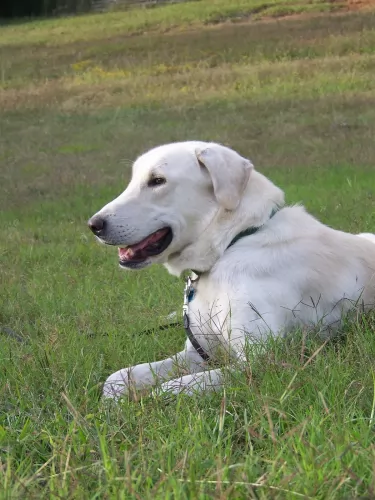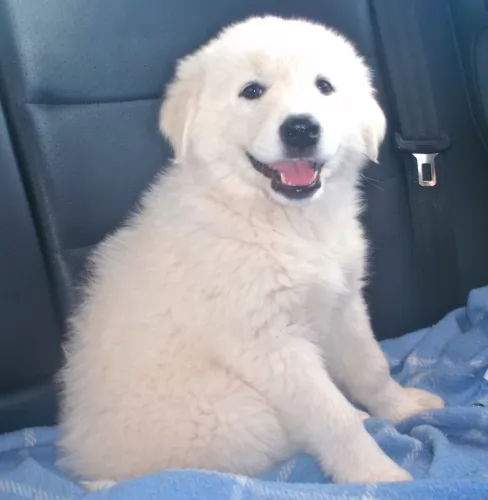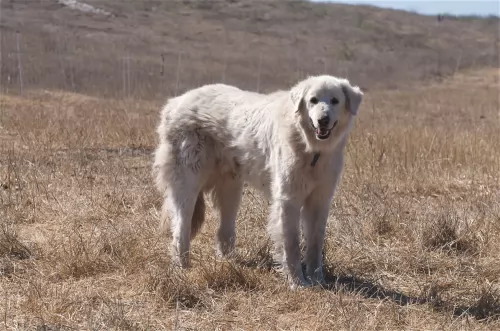 Petzlover
PetzloverAkbash Dog is originated from Turkey but Walker Hound is originated from United States. Akbash Dog may grow 15 cm / 6 inches higher than Walker Hound. Akbash Dog may weigh 33 kg / 73 pounds more than Walker Hound. Both Akbash Dog and Walker Hound has almost same life span. Both Akbash Dog and Walker Hound has almost same litter size. Akbash Dog requires Moderate Maintenance. But Walker Hound requires Low Maintenance
 Akbash breed became popular in the 1970s. Around that period, Akbash was introduced to North America. There is archeological evidence that this breed was popular even in the 750-300 BC. Of course, it wasn’t the exact dog as we know it today, but there are many similarities between Akbash and dog from the ancient period. This breed was developed in Turkey to be a guardian dog. They were perfect flock guardians.
Akbash breed became popular in the 1970s. Around that period, Akbash was introduced to North America. There is archeological evidence that this breed was popular even in the 750-300 BC. Of course, it wasn’t the exact dog as we know it today, but there are many similarities between Akbash and dog from the ancient period. This breed was developed in Turkey to be a guardian dog. They were perfect flock guardians.
The Walker Hound is actually two different breeds today both descendant from the original Walker. They are the Running Walker Hound and the Treeing Walker Coonhound and mark their ancestors as the American Foxhound and the English Foxhound. The Treeing Walker is a breed developed in the United States when a “Tennessee Lead Dog” was crossed with a Walker Hound. The Running Walker is considered a Foxhound not a coonhound. They Running Walker does not have a treeing instinct and is not as common in hunting in the southern US as the Treeing Walker Coonhound.
In 1945 the United Kennel Club (UKC) recognized the Treeing Walker Coonhound and by the AKC (American Kennel Club) in 2012. They were developed to hunt and “tree” racoons – so the coonhound label. They also are capable of hunting bears, deer, bobcats and mountain lions. Their baying voice is distinctive that even at a great distance a hunter can recognize the voice of his dog.
Both types of Walkers are calm, gentle and friendly family dogs. The original Walker Hounds were bred in Kentucky by John Walker and George Maupin. The Walker Coonhound, Treeing was recognized as part of the English Coonhound breed by the UKC in 1905. In 1945, they were then recognized as their own breed by the UKC.
They have become the most popular hound competitor in coon hunt competitions. They are known for speed and an ability to catch more racoons in a shorter period of time than any other coonhound. They also tree squirrels, cougars. Opossums, roof rats and skunks.
 Weight of the Akbash dog variates from 41-64kg, while their height is 71-78cm. Female Akbash is smaller than a male Akbash, but not for much.
A lifespan of an average Akbash dog is 10-11 years, but if they have cared properly, they tend to live longer.
Litter Size of Akbash is 8-9 puppies.
Another Name for Akbash is Akbas Coban Kopegi, Coban Kopegi.
Weight of the Akbash dog variates from 41-64kg, while their height is 71-78cm. Female Akbash is smaller than a male Akbash, but not for much.
A lifespan of an average Akbash dog is 10-11 years, but if they have cared properly, they tend to live longer.
Litter Size of Akbash is 8-9 puppies.
Another Name for Akbash is Akbas Coban Kopegi, Coban Kopegi.
This working dog is tall and lean with the males being somewhat larger than the females. They have broad skulls and hanging, long ears with a long muzzle. They have a soft expression in their dark eyes, straight legs and compact cat-like feet. The coat is smooth, glossy and fine. The traditional color is a tricolor or a bi-color in white with black and tan markings. The bicolors are white and tan or white and black. Their speed comes from the long , powerful and muscled legs and hindquarters along with the frame that is lean and streamlined.
 Have in mind that Akbash is a large and powerful dog. They are bred through generations to be guardians and suspicious. They are very independent because they tend to make their own decisions while guarding flocks. They will require adequate socialization, but overall, they are very intelligent and they tend to learn quickly. It requires time and patience, but are great pets for right owners. Akbash has a white to biscuit color coat. They also have a dark pigment around nose, eyes, and mouth. Akbash is very quick and agile dog, which might be surprised because of its size.
Have in mind that Akbash is a large and powerful dog. They are bred through generations to be guardians and suspicious. They are very independent because they tend to make their own decisions while guarding flocks. They will require adequate socialization, but overall, they are very intelligent and they tend to learn quickly. It requires time and patience, but are great pets for right owners. Akbash has a white to biscuit color coat. They also have a dark pigment around nose, eyes, and mouth. Akbash is very quick and agile dog, which might be surprised because of its size.
It is important to train them since the puppyhood. They are working dogs and they will be happy when they have tasks during training. Due to their independence, consistent and steady training is important. An old-fashioned way of training that includes punishment is not recommendable. Positive training with awards is the best way to train your Akbash dog. They do not require a lot of daily exercises. Daily walks would do more than enough. Younger dogs need more exercise than more mature ones. They can be very good for other animals, but they have to be socialized with them. It is the best way to socialize your dog when it is still a puppy.
2.Special talents Walkers are capable of covering a lot of ground in a hurry. Speed and treeing instinct.
The Treeing Walker Coonhound is a fairly healthy breed needing to watch out for accidents on the hunting trail from shrubs, brush and tree limbs. They can become tick infested if you are not careful, especially in their long ears that flop on the side of their head. Clean their ears weekly and check them after every run in the woods.
They are also prone to hip dysplasia and eye issues. Hip dysplasia can cause lameness and/or arthritis. Before to keep the ear clear of debris and wax to avoid ear infections.
 Akbash dog is very easy to care. They can stay fit on a minimum amount of food. 2-2.5 cups divided into two meals would be ideal for your dog. They require meat, so giving them dry industrial food can be a solid substitute. Vegetables and oil can also be included in meals. It will keep your dog healthy and happy.
Akbash dog is very easy to care. They can stay fit on a minimum amount of food. 2-2.5 cups divided into two meals would be ideal for your dog. They require meat, so giving them dry industrial food can be a solid substitute. Vegetables and oil can also be included in meals. It will keep your dog healthy and happy.
Puppies have to eat more meals per day. It is the best to give your puppy Akbash 3-5 meals per day. Those meals should be divided into smaller portions. It is recommended to give your puppy all necessary vitamins and minerals that include calcium for stronger bones. It will improve the overall health of your dog, and it will help it develop into a healthy adult dog.
Akbash will request some grooming, but they are not very difficult to groom. They require regular grooming. Every few days will be enough, except when they are shedding. Akbash will need daily grooming when shed. You can bath your pet occasionally, but not very often. Bathing, if necessary, should be done only 5-6 times a year. There is no need for more.
1Feeding the puppy – don’t overfeed. Feed quality medium size breed 3-4 small meals per day
2.Feeding the adult – don’t overfeed. Feed quality medium size breed 1-2 small meals per day
running or hiking companion. long daily walks at a minimum. He loves to run and play with his family. Hunting and “coon trials” are his specialty and best ways to get exercise. He needs to run